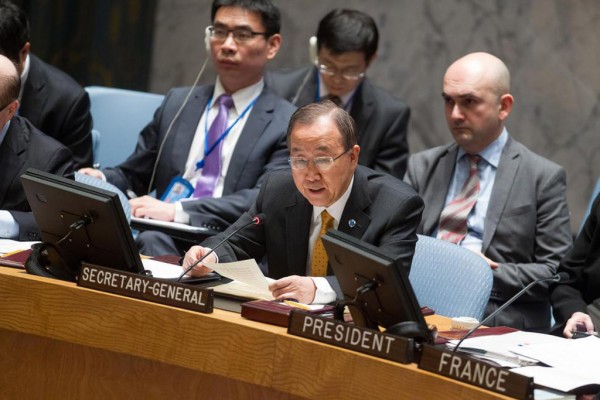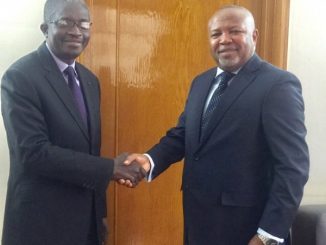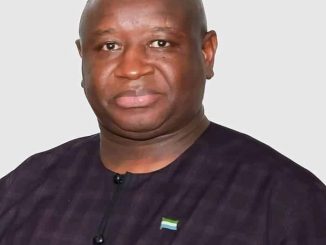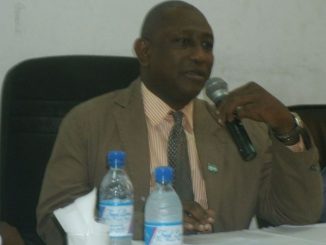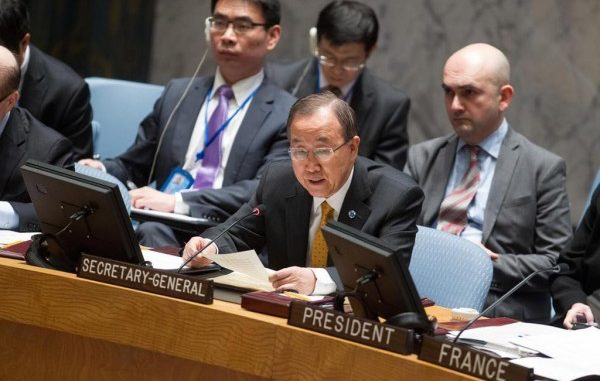
THE SECRETARY-GENERAL
—
REMARKS TO THE SECURITY COUNCIL:
SEXUAL EXPLOITATION AND ABUSE
New York, 10 March 2016
[As delivered, bilingual version]
Thank you for this opportunity to brief you on important steps being taken and measures being put in place to end the exploitation and abuse of vulnerable people by United Nations personnel sent to protect them.
For many people caught up in poverty and conflict around the world, the United Nations represents their final hope for a better future. When sexual exploitation and abuse are perpetrated on these individuals by the United Nations personnel authorised to protect them, it further victimizes and violates them and inflicts untold harm on already fragile communities.
It undermines the trust between the United Nations and its beneficiaries, betrays the values and principles that the UN purports to advance, and tarnishes the credibility of United Nations peacekeeping operations and the United Nations as a whole.
The impact is not limited to the location of the abuse, but reflect on the efforts of tens of thousands of peacekeepers and civilian staff working tirelessly to save lives and protect people around the world in difficult and often dangerous conditions.
In June 2015, I, like you, was deeply dismayed by allegations of sexual exploitation and abuse of children by foreign military forces in the Central African Republic, and the United Nations’ response to these allegations.
In this context, I appointed a High Level External Independent Review Panel on Sexual Exploitation and Abuse by International Peacekeeping Forces in the Central African Republic. The panel was led by distinguished Justice Marie Deschamps, with two other eminent persons. In mid-December 2015, the Panel submitted its report which depicted a United Nations that uncovered the abuses, but failed to respond meaningfully and with the speed, care or sensitivity required.
A number of the Panel’s recommendations are already being implemented, while those that have far-reaching implications or require action by legislative bodies, Member States and partners are being considered.
Given the importance of addressing the systemic weaknesses that the Panel’s report exposed, I have appointed a Special Coordinator, Ms. Jane Holl Lute. Ms. Lute will support me in reviewing and advancing implementation of the Panel’s recommendations and in strengthening our response to such abuse.
Let me turn to my latest annual report to the General Assembly on Special Measures on Protection from Sexual Exploitation and Abuse.
The report shows an increase in the number of new allegations in 2015, with a total of 99 for the United Nations system. Sixty-nine of these allegations were lodged against United Nations personnel serving in peace operations. This reflects an increase in allegations within UN peacekeeping operations, with multiple allegations from MINUSCA and increases in allegations from MONUSCO, ONUCI and MINUSMA. Further allegations have continued to come to light this year.
In the face of this disturbing trend across a number of our peacekeeping operations, it is imperative that our collective response is more effective.
My report proposes strong new initiatives in three key areas: first – ending impunity, second – helping and supporting victims; and third – strengthening accountability, including through action by Member States.
First and foremost, to end impunity, greater transparency is critical.
This year, for the first time, my report names the countries of alleged perpetrators. Country-specific information is publicly available on the website of the Conduct and Discipline Unit of the Department of Field Support. I intend to expand this information to cover all outstanding allegations of sexual exploitation and abuse, including the status of referrals for criminal accountability.
This will enable and hold accountable the United Nations and Member States to address every allegation of sexual exploitation or abuse in a thorough and timely manner, through proper investigation and just punishment.
Second, the victims, many of whom are children, need our protection and support. We are finalizing the establishment of a trust fund that will provide them with the medical, psychosocial and legal services they need.
I have asked Member States to approve the transfer to the trust fund of payments that will be withheld in substantiated cases of sexual exploitation and abuse. I encourage Member States to make voluntary contributions to the fund.
I have also urged all troop and police contributing countries to designate paternity focal points. We will follow up vigorously to ensure that children borne as a result of these terrible abuses receive the support they need.
Member States must also consider how they will respond to claims from victims who pursue legal action to seek redress.
Third, accountability demands the conduct of solid investigations that can withstand judicial scrutiny in disciplinary and criminal proceedings.
This will require developing uniformly high standards of investigation.
It entails building the capacities of Immediate Response Teams to gather and preserve evidence.
All investigations should be concluded within six months at most, with the most urgent cases concluded within three months. I urge Member States to adopt this standard.
I also urge Member States to cooperate with the Office of Internal Oversight Services (OIOS) in the conduct of investigations.
I am strongly committed to monitoring accountability for violations. Where appropriate, this will include taking action up to and including the repatriation of commanders, or of whole contingents.
We have already put this into practice in repatriating troops serving in the Central African Republic, due to alleged sexual exploitation and abuse.
When I requested the resignation of my Special Representative for MINUSCA last August, I further signalled that this Organization would hold itself accountable for such violations.
I will also consider ending the deployment of uniformed personnel from specific Member States if there is prima facie evidence of widespread or systemic exploitation and abuse.
Accountability demands that Member States live up to their responsibility to bring to justice those who have committed crimes while serving with the United Nations. We expect them to impose sanctions commensurate with the seriousness of the offence.
I have asked Member States to establish on-site court martial proceedings, and to ensure that domestic legislation applies to sex crimes committed by their nationals while they are serving [in] United Nations peace operations. I have also called for the collection of DNA samples of alleged offenders.
We also continue to emphasize prevention. Significantly, this year, for the first time, we will be able to vet all uniformed personnel for previous allegations of misconduct while in the service of the United Nations. We are increasing our support for pre-deployment training by Member States.
We will also consider imposing new rules to curtail the social activities of peacekeeping contingents, including designating certain geographical areas as out-of-bounds.
Ces efforts constituent un pas important vers la fin de ces crimes et des terribles souffrances qu’ils infligent aux victimes. Nous ne pouvons assurer l’application du principe de responsabilité, notamment de responsabilité pénale, que si les pays qui fournissent des contingents et du personnel de police enquêtent rapidement et minutieusement sur de telles allégations et si les auteurs sont dûment punis.
L’Organisation des Nations Unies est fermement déterminée à œuvrer avec les États Membres afin que l’action judiciaire nationale permette d’appliquer le principe de responsabilité et de combattre l’impunité.
This is a global issue. It is not confined to any one region, mission or nation.
I am determined that the United Nations must lead by example.
Sexual exploitation and abuse by United Nations personnel demands nothing less than decisive and bold action.
I am committed to working with Member States to confront this criminal conduct, and to justify the trust of the people we serve, to ensure that this Organization remains a beacon of hope for the most vulnerable.
Thank you.
UN LOGO Blue.jpg
From: Jane Gaffney [mailto:gaffney@un.org] On Behalf Of UN Spokesperson – Do Not Reply
Sent: Thursday, March 10, 2016 11:43 PM
Subject: UN Secretary-General?s answers to questions raised at Security Council meeting on Sexual Exploitation and Abuse
Secretary-General’s answers to questions raised at Security Council meeting
on Sexual Exploitation and Abuse
New York, 10 March 2016
Thank you, Mr. President, and distinguished members of the Council.
First of all, I would like to thank you for your initiative in organizing this very important subject, which has a lot to do with our reputation and of our work in the future.
This open discussion on this shameful issue will raise the urgency and awareness of the necessity of taking immediate action based on the principle of accountability and transparency. It has really made me not only humbled and feeling very much regretful, as well as shame-filled, as Secretary-General of the United Nations, but I am sure that this message that you have conveyed strongly without any ambiguity will have myself and senior advisors of the United Nations, who are engaged in this, particularly at the responsible positions of staff, will be much more committed on this matter.
Again, I am very much feeling sorry for the victims, and particularly those young minors whose human rights and dignity have been totally abused by this. I really apologise for not having taken as much thorough care on this matter.
I really thank you for your providing, presenting clear guidelines and directions to the Secretariat, myself and for the world. The United Nations is very much committed on that.
As Ambassador Samantha Power has eloquently and passionately and emotionally stated – this has much to do with our reputation. And how come we have not been able to address this issue so much, much earlier. There are some people who really make a problem. There is a saying that a small roach or mudfish can make a clean stream dirty and murky. But we have to really get rid of, eliminate these kind of practices – these kind of roaches and mudfish.
I am very much committed to working with you on this matter. At the same time, while this has been quite shameful, we have to honour the integrity and sacrifice and hard work of tens of thousands of peacekeepers and police officers who are working under very difficult and often dangerous circumstances. We have lost a lot of peacekeepers. We have to really honour their reputation; their integrity, their honour should not be tarnished by the small number of people. I am really committing myself on this matter.
During my term as Secretary-General, since 2007, I have been really raising this issue as one of my top priorities – how to end violence against women. In 2007, you may remember that I launched a Unite to End Violence against Women [campaign]. In 2008, knowing that without changing the mentality of men, I established a Man Leaders’ Network. I have reached out to so many man leaders – government leaders, business community leaders, religious leaders. We have been reaching out to the world to eliminate these practices. Now, what is happening in-house now? We have been neglecting our concerns in-house. This is happening in-house. We have to be responsible on this matter. And of course, I have appointed for the first time the Special Representative on Sexual Violence, and I have a Special Representative on Children and Armed Conflict, and I have again appointed, most recently, Jane Holl Lute. Appointing Special Representatives or responsible persons may be helpful, but I need everybody – all Member States, and the Secretariat and the people who are working in the field. I think all these three parts of people must work together.
As I have presented in my report, I think this should be addressed comprehensively. First and foremost, we have to do much, much more on ending this violence. Then how to help those people? I really appreciate your willingness to provide financial and other material support to the Trust Fund. At the same time, I am also grateful for your agreement to my proposal that all salaries of those people who have committed violence would be withheld, and will be used, transferred to the Trust Fund. Those are just small things, but I would really need your strong support.
Now, how to make sure that accountability, responsibility, should be there and enhanced and implemented without making this accountability process firmly established in the mind set and in our system, I think we will be able to [inaudible] have to see continuing this kind of crime. In that regard, I am making sure that we will expedite our investigations on current pending issues.
From 2010 until 2015 we have received 407 alleged cases. Out of these, we have 80 percent of cases concluded. We still have, as of end of 2015, 54 cases. Among these 54 cases, I think a big chunk are the cases which have been reported in 2015. Of the 2012 [cases] I think we have concluded all the investigations. 2013 – we have still three cases. 2014 – we have three cases outstanding and we will make sure we expedite this investigation as much as possible. Out of 407 cases we have concluded 353 cases. But still 48 cases are still remaining. I will make sure that we will expedite. Even though I suggested six-month investigations, we will have even shorten this investigation process.
Once allegations have been reported, or a report has been received, we will take interim measures, for example, suspending the persons involved from the Mission, or confining to barracks, or giving some other conditions which will have to confine this person inside the Missions. And of course, the salaries will be withheld as much as possible.
In the course of discussions, some Member States have, of course I agree that the honour and reputation of the TCC countries should be respected. We have been respecting this honour, without disclosing the name of a country up to most recently. But that, we have realised, has not helped much. That is why last year we have returned [peacekeepers from] certain Member States whose names have already been publicized and we also established a Conduct and Discipline website where we are making all the names of the countries and cases always available to the Member States and to the public and to the international community. Therefore, there may be always some questions whether shaming and naming is good policy or not, at this time. Sometimes we need to make it known to the public so that they will also be motivated so improve their way of conducting their business. In that regard, as most of you have explained and expressed, it will be extremely important that troop contributing countries have pre-deployment education and training, and firm and strong education, training, on the importance of respecting human rights, particularly respecting gender empowerment, not to commit gender imbalance.
Without the strong engagement and commitment of the Member States it will be extremely difficult for only Secretariat to manage these cases. As Secretary-General, during the last many years, I have been confronting many Heads of States – in front of, directly, brushing my face – “you cannot go like this.” Some Heads of State made some excuses. “This was not done by my people.” I am talking about national crimes, national sexual violence – not UN. “This has been committed by rebels.”
“But Mr. President, is it not that you are the President of this sovereign state within the territorial boundaries. Now whoever commits this crime, it is your responsibility, you have to be accountable.” I have been really brushing my face and fighting with Heads of State. I am now asking again, and committing myself again, to really confront with any country who are continuing to commit these kinds of crime, particularly within the United Nations, in-house. I think we have to make our house clean and then I can go to Member States worldwide to eradicate this sexual violence against women. This is my strong commitment. And I really count on your strong engagement and support. I really appreciate this kind of Security Council [session], raising this issue.

